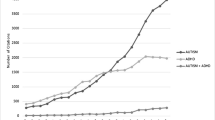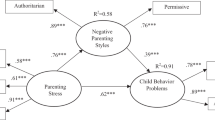Abstract
The current study systematically tested the incremental and interactive associations of parental depression, parental attention-deficit/hyperactivity disorder (ADHD), and child behavior problems, as related to parenting in families of children with ADHD. Participants were 213 children with ADHD (age M(SD) = 8.58(1.55); 69% male), who each took part in the study with one parent (age M(SD) = 41.13(6.03); 10% male). Parents self-reported their own depressive and ADHD symptoms. Positive (e.g., being involved, praising the child) and negative (e.g., being over-reactive, criticizing the child) parenting behaviors were self-reported by parents and observed in an interaction task with the child. Children’s oppositional defiant disorder (ODD) and ADHD behavior problems were reported by parents and teachers. Results revealed that parental depressive symptoms were associated with more self-reported negative and less self-reported positive parenting after adjusting for parental ADHD symptoms and child behavior problems. Parental ADHD symptoms were associated with more self-reported negative parenting after adjusting for child behavior problems, but not incrementally over parental depressive symptoms. An interaction effect was found, where parental ADHD symptoms were associated with more self-reported negative parenting when depressive symptoms were low. Parental psychopathology was not associated with observations of parenting. Regarding child behavior problems, only child ODD behavior was associated with more self-reported negative parenting, and no interactions between parent and child psychopathology were associated with parenting behavior. Future research, assessment, and treatment of families with children with ADHD should consider both types of parental psychopathology, and their potential interaction, alongside the contribution of child ODD behavior.
Similar content being viewed by others
References
Achenbach, T. M., & Rescorla, L. A. (2001). Manual for the ASEBA school-age forms & profiles. University of Vermont, Research Center for Children, Youth, & Families.
American Psychiatric Association. (2013). Diagnostic and Statistical Manual of Mental Disorders: DSM 5. American Psychiatric Association.
Arnold, D. S., O’Leary, S. G., Wolff, L. S., & Acker, M. M. (1993). The parenting scale: a measure of dysfunctional parenting in discipline situations. Psychological Assessment, 5(2), 137–144. https://doi.org/10.1037/1040-3590.5.2.137.
Axelson, D., Birmaher, B., Zelazny, A., Kaufman, J., & Gill, M. K. (2009). K-SADS-PL 2009 Working Draft. Western Psychiatric Institute and Clinic. Retrieved from https://www.scribd.com/document/75326960/KSADS-PL-2009-Working-Draft-Full
Barkley, R. A., & Murphy, K. R. (2006). Attention-deficit/hyperactivity disorder: A clinical workbook (3rd ed.). The Guilford Press.
Beck, A. T., Steer, R. A., & Brown, G. K. (1996). Manual for the Beck Depression Inventory—II. Psychological Corporation.
Cheung, K., & Theule, J. (2019). Paternal depressive symptoms and parenting behaviors: an updated meta-analysis. Journal of Child and Family Studies, 28(3), 613–626. https://doi.org/10.1007/s10826-018-01316-1.
Chi, T. C., & Hinshaw, S. P. (2002). Mother–child relationships of children with ADHD: the role of maternal depressive symptoms and depression-related distortions. Journal of Abnormal Child Psychology, 30(4), 387–400.
Chronis, A. M., Lahey, B. B., Pelham, W. E., Kipp, H. L., Baumann, B. L., & Lee, S. S. (2003). Psychopathology and substance abuse in parents of young children with attention-deficit/hyperactivity disorder. Journal of the American Academy of Child & Adolescent Psychiatry, 42(12), 1424–1432. https://doi.org/10.1097/00004583-200312000-00009.
Chronis-Tuscano, A., Clarke, T. L., O’Brien, K. A., Raggi, V. L., Diaz, Y., Mintz, A. D., Rooney, M. E., Knight, L. A., Seymour, K. E., Thomas, S. R., Seeley, J., Kosty, D., & Lewinsohn, P. (2013). Development and preliminary evaluation of an integrated treatment targeting parenting and depressive symptoms in mothers of children with attention-deficit/hyperactivity disorder. Journal of Consulting and Clinical Psychology, 81(5), 918–925. https://doi.org/10.1037/a0032112.
Chronis-Tuscano, A., Raggi, V. L., Clarke, T. L., Rooney, M. E., Diaz, Y., & Pian, J. (2008). Associations between maternal attention-deficit/hyperactivity disorder symptoms and parenting. Journal of Abnormal Child Psychology, 36(8), 1237–1250. https://doi.org/10.1007/s10802-008-9246-4.
Deault, L. C. (2010). A systematic review of parenting in relation to the development of comorbidities and functional impairments in children with attention-deficit/hyperactivity disorder (ADHD). Child Psychiatry & Human Development, 41(2), 168–192. https://doi.org/10.1007/s10578-009-0159-4.
DiStefano, C., Zhu, M., & Mindrila, D. (2009). Understanding and using factor scores: considerations for the applied researcher. Practical Assessment, Research & Evaluation, 14, 1–11.
Ellis, B., & Nigg, J. (2009). Parenting practices and attention-deficit/hyperactivity disorder: new findings suggest partial specificity of effects. Journal of the American Academy of Child & Adolescent Psychiatry, 48(2), 146–154. https://doi.org/10.1097/CHI.0b013e31819176d0.
Evans, S. W., Owens, J. S., Wymbs, B. T., & Ray, A. R. (2018). Evidence-based psychosocial treatments for children and adolescents with attention deficit/hyperactivity disorder. Journal of Clinical Child & Adolescent Psychology, 47(2), 157–198. https://doi.org/10.1080/15374416.2017.1390757.
Gadow, K. D., & Sprafkin, J. (2002). Child Symptom Inventory-4 screening and norms manual. Checkmate Plus.
Geller, J., & Johnston, C. (1995). Predictors of mothers’ responses to child noncompliance: attributions and attitudes. Journal of Clinical Child Psychology, 24(3), 272–278.
Gerdes, A. C., Hoza, B., Arnold, L. E., Pelham, W. E., Swanson, J. M., Wigal, T., & Jensen, P. S. (2007). Maternal depressive symptomatology and parenting behavior: exploration of possible mediators. Journal of Abnormal Child Psychology, 35(5), 705–714. https://doi.org/10.1007/s10802-007-9134-3.
Gomez, R. (2011). Item response theory analyses of adult self-ratings of the ADHD symptoms in the current symptoms scale. Assessment, 18(4), 476–486. https://doi.org/10.1177/1073191110386341.
Goodman, R. (1997). The strengths and difficulties questionnaire: a research note. Journal of Child Psychology and Psychiatry, 38(5), 581–586. https://doi.org/10.1111/j.1469-7610.1997.tb01545.x.
Harvey, Danforth, J. S., Ulaszek, W. R., & Eberhardt, T. L. (2001). Validity of the parenting scale for parents of children with attention-deficit/hyperactivity disorder. Behaviour Research and Therapy, 39(6), 731–743. https://doi.org/10.1016/S0005-7967(00)00052-8.
Hay, D. F., & Pawlby, S. (2003). Prosocial development in relation to children’s and mothers’ psychological problems. Child Development, 74(5), 1314–1327. https://doi.org/10.1111/1467-8624.00609.
Holmbeck, G. N. (2002). Post-hoc probing of significant moderational and mediational effects in studies of pediatric populations. Journal of Pediatric Psychology, 27(1), 87–96. https://doi.org/10.1093/jpepsy/27.1.87.
Hurley, K. D., Huscroft-D’Angelo, J., Trout, A., Griffith, A., & Epstein, M. (2014). Assessing parenting skills and attitudes: a review of the psychometrics of parenting measures. Journal of Child and Family Studies, 23(5), 812–823. https://doi.org/10.1007/s10826-013-9733-2.
Johnston, C., & Chronis-Tuscano, A. (2015). Families and ADHD. In R. A. Barkley (Ed.) Attention-Deficit/Hyperactivity Disorder: A handbook for diagnosis and treatment (4th ed., pp. 191–209). The Guilford Press.
Johnston, C., & Mash, E. J. (2001). Families of children with attention-deficit/hyperactivity disorder: review and recommendations for future research. Clinical Child and Family Psychology Review, 4(3), 183–207. https://doi.org/10.1023/A:1017592030434.
Johnston, C., Mash, E. J., Miller, N., & Ninowski, J. E. (2012). Parenting in adults with attention-deficit/hyperactivity disorder (ADHD). Clinical Psychology Review, 32(4), 215–228. https://doi.org/10.1016/j.cpr.2012.01.007.
Johnston, C., Murray, C., Hinshaw, S. P., Pelham, W. J., & Hoza, B. (2002). Responsiveness in interactions of mothers and sons with ADHD: relations to maternal and child characteristics. Journal of Abnormal Child Psychology, 30(1), 77–88.
Johnston, C., Scoular, D. J. & Ohan, J. L. (2004). Mothers’ reports of parenting in families of children with symptoms of attention-deficit/hyperactivity disorder: Relations to impression management. Child & Family Behavior Therapy, 26(1), 45–61. https://doi.org/10.1300/J019v26n01_04.
Lahey, B. B., Applegate, B., McBurnett, K., Biederman, J., Greenhill, L., Hynd, G. W., Barkley, R., & Newcorn, J. (1994). DSM-IV field trials for attention deficit hyperactivity disorder in children and adolescents. American Journal of Psychiatry, 151(11), 1673–1685. https://doi.org/10.1176/ajp.151.11.1673.
Little, R. J. A., & Rubin, D. B. (2002). Statistical analysis with missing data (2nd ed.). Wiley.
Lovejoy, M. C., Graczyk, P. A., O’Hare, E., & Neuman, G. (2000). Maternal depression and parenting behavior: a meta-analytic review. Clinical Psychology Review, 20(5), 561–592. https://doi.org/10.1016/S0272-7358(98)00100-7.
Lui, J. H. L., Johnston, C., Lee, C. M., & Lee-Flynn, S. C. (2013). Parental ADHD symptoms and self-reports of positive parenting. Journal of Consulting and Clinical Psychology, 81(6), 988–998. https://doi.org/10.1037/a0033490.
Mazursky-Horowitz, H., Felton, J. W., MacPherson, L., Ehrlich, K. B., Cassidy, J., Lejuez, C. W., & Chronis-Tuscano, A. (2015). Maternal emotion regulation mediates the association between adult attention-deficit/hyperactivity disorder symptoms and parenting. Journal of Abnormal Child Psychology, 43(1), 121–131. https://doi.org/10.1007/s10802-014-9894-5.
McIntosh, D., Kutcher, S., Binder, C., Levitt, A., Fallu, A., & Rosenbluth, M. (2009). Adult ADHD and comorbid depression: a consensus-derived diagnostic algorithm for ADHD. Neuropsychiatric Disease and Treatment, 5, 137–150.
Modesto-Lowe, V., Danforth, J. S., & Brooks, D. (2008). ADHD: does parenting style matter? Clinical Pediatrics, 47(9), 865–872. https://doi.org/10.1177/0009922808319963.
Murray, C., & Johnston, C. (2006). Parenting in mothers with and without attention-deficit/hyperactivity disorder. Journal of Abnormal Psychology, 115(1), 52–61. https://doi.org/10.1037/0021-843X.115.1.52.
Muthén, L. K., & Muthén, B. O. (2017). Mplus user’s guide (8th ed.). Muthén & Muthén.
Park, J. L., Hudec, K. L., & Johnston, C. (2017). Parental ADHD symptoms and parenting behaviors: a meta-analytic review. Clinical Psychology Review, 56, 25–39. https://doi.org/10.1016/j.cpr.2017.05.003.
Psychogiou, L., Daley, D. M., Thompson, M. J., & Sonuga-Barke, E. J. S. (2008). Do maternal attention-deficit/hyperactivity disorder symptoms exacerbate or ameliorate the negative effect of child attention-deficit/hyperactivity disorder symptoms on parenting? Development and Psychopathology, 20(1). https://doi.org/10.1017/S0954579408000060.
Shelton, K. K., Frick, P. J., & Wootton, J. (1996). Assessment of parenting practices in families of elementary school-age children. Journal of Clinical Child Psychology, 25(3), 317–329.
Shrout, P. E., & Fleiss, J. L. (1979). Intraclass correlations: uses in assessing rater reliability. Psychological Bulletin. https://doi.org/10.1037/0033-2909.86.2.420.
Stevenson-Hinde, J., & Shouldice, A. (1995). Maternal interactions and self-reports related to attachment classifications at 45 years. Child Development, 66(3), 583–596. https://doi.org/10.2307/1131936.
Takeda, T., Stotesbery, K., Power, T., Ambrosini, P. J., Berrettini, W., Hakonarson, H., & Elia, J. (2010). Parental ADHD status and its association with proband ADHD subtype and severity. The Journal of Pediatrics, 157(6), 995–1000.e1. https://doi.org/10.1016/j.jpeds.2010.05.053.
Thomas, S. R., O’Brien, K. A., Clarke, T. L., Liu, Y., & Chronis-Tuscano, A. (2015). Maternal depression history moderates parenting responses to compliant and noncompliant behaviors of children with ADHD. Journal of Abnormal Child Psychology, 43(7), 1257–1269. https://doi.org/10.1007/s10802-014-9957-7.
Unternaehrer, E., Cost, K. T., Bouvette‐Turcot, A.-A., Gaudreau, H., Massicotte, R., Dhir, S. K., Dass, S. A. H., O’Donnell, K. J., Gordon‐Green, C., Atkinson, L., Levitan, R. D., Wazana, A., Steiner, M., Lydon, J. E., Clark, R., Fleming, A. S., & Meaney, M. J. (2019). Dissecting maternal care: Patterns of maternal parenting in a prospective cohort study. Journal of Neuroendocrinology, 31(9), e12784 https://doi.org/10.1111/jne.12784.
Wechsler, D. (2003). Wechsler Intelligence Scale for Children (WISC-IV) (4th ed.). Psychological Corporation.
Wechsler, D. (2011). Wechsler Abbreviated Scale of Intelligence (WASI) (2nd ed.). NCS Pearson.
Woods, K. E., Mazursky-Horowitz, H., Thomas, S. R., Dougherty, L. R., & Chronis-Tuscano, A. (2019). The unique effects of maternal ADHD symptoms and emotion dysregulation on parenting behavior. Journal of Attention Disorders, 1087054719829820. https://doi.org/10.1177/1087054719829820.
Wymbs, B. T., Dawson, A. E., Egan, T. E., Sacchetti, G. M., Tams, S. T., & Wymbs, F. A. (2017). ADHD and depression symptoms in parent couples predict response to child ADHD and ODD behavior. Journal of Abnormal Child Psychology, 45(3), 471–484. https://doi.org/10.1007/s10802-016-0220-2.
Wymbs, B. T., Wymbs, F. A., & Dawson, A. E. (2015). Child ADHD and ODD behavior interacts with parent ADHD symptoms to worsen parenting and interparental communication. Journal of Abnormal Child Psychology, 43(1), 107–119. https://doi.org/10.1007/s10802-014-9887-4.
Acknowledgements
We would like to thank the participating families and the great investment from study staff members (including collaborators and many graduate and undergraduate students) who made this research possible.
Funding
This work was supported by the Canadian Institutes of Health Research and the Michael Smith Foundation for Health Research.
Author information
Authors and Affiliations
Corresponding author
Ethics declarations
Conflict of Interest
The authors declare no competing interests.
Additional information
Publisher’s note Springer Nature remains neutral with regard to jurisdictional claims in published maps and institutional affiliations.
Supplementary Information
Rights and permissions
About this article
Cite this article
Smit, S., Mikami, A.Y. & Normand, S. Parenting Children with ADHD: Associations with Parental Depression, Parental ADHD, and Child Behavior Problems. J Child Fam Stud 30, 1156–1170 (2021). https://doi.org/10.1007/s10826-021-01944-0
Accepted:
Published:
Issue Date:
DOI: https://doi.org/10.1007/s10826-021-01944-0




